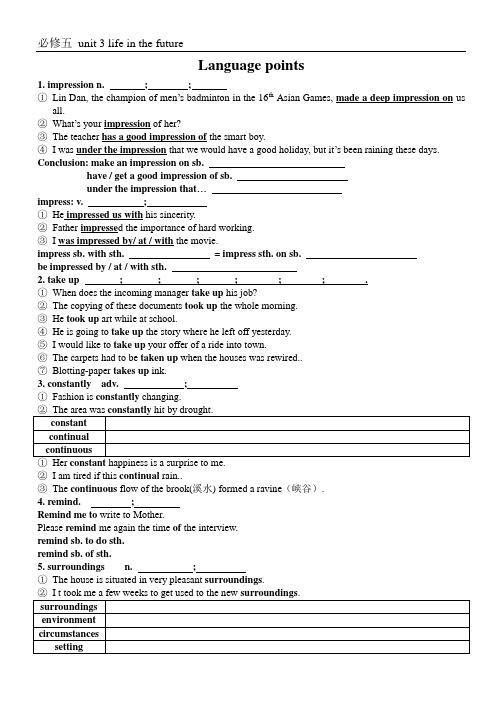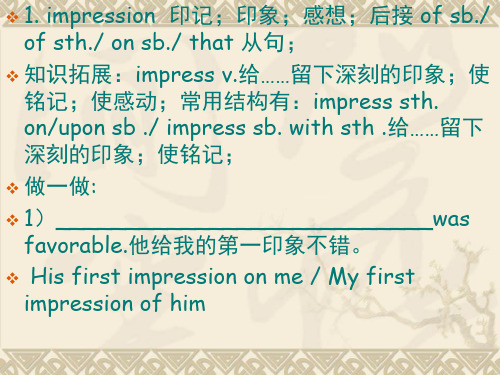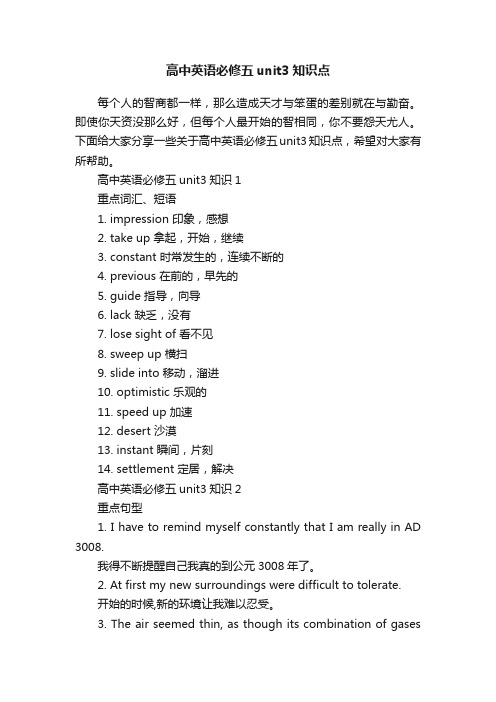人教版新课标必修五高考英语 unit3单元知识点归纳
- 格式:doc
- 大小:140.00 KB
- 文档页数:14

1.What changes do you expect to see in your life in one thousand years5 time?1). I smell something _____ in the kitchen. Can I call you back in a minute? [07 全国卷I]A. burningB. burntC. being burntD. to be burnt2). Jenny hopes that Mu Smith will suggest a good way to have her written English __________ i n ashort period.A.improvedB.improvingC.to improveD.improve [07 福建卷]2.Skim the reading passage and see whether your ideas are the same as those in the text. 代词“those, it, that, one”等的区分历来在考题中都是常客,所以我们一定要细心区分。
1). Little joy can equal ____ of a surprising ending when you read stories. [2007 四川卷]A. thatB. thoseC. anyD. some2). The information on the Internet gets around much more rapidly than _____ i n the newspaper.A. itB. thoseC. oneD. that [2007 辽宁卷]3). The English spoken in the United States is only slightly different from ___ s poken in England.A. whichB. whatC. thatD. the one (08 全国I 卷)5). Enemies behind the scene are more dangerous than _______ o n the stage.A. itB. theseC. thoseD. that3.I still cannot believe that I am taking up this prize that I won last year.“takeup”表示“占有,占据,拥有”的意思。

1. impression n. ; ;①Lin Dan, the champion of men’s badminton in the 16th Asian Games, made a deep impression on usall.②What’s your impression of her?③The teacher has a good impression of the smart boy.④I was under the impression that we would have a good holiday, but it’s been raining these days. Conclusion:make an impression on sb.have / get a good impression of sb.under the impression that…impress: v. ;①He impressed us with his sincerity.②Father impresse d the importance of hard working.③I was impressed by/ at / with the movie.impress sb. with sth. = impress sth. on sb.be impressed by / at / with sth.2. take up ; ; ; ; ; ; .①When does the incoming manager take up his job?②The copying of these documents took up the whole morning.③He took up art while at school.④He is going to take up the story where he left off yesterday.⑤I would like to take up your offer of a ride into town.⑥The carpets had to be taken up when the houses was rewired..⑦Blotting-paper takes up ink.3. constantly adv. ;①Fashion is constantly changing.②I am tired if this continual rain..③The continuous flow of the brook(溪水) formed a ravine(峡谷).4. remind. ;Remind me to write to Mother.Please remind me again the time of the interview.remind sb. to do sth.remind sb. of sth.5. surroundings n. ;①The house is situated in very pleasant surroundings.6. tolerate ; ; ;①The human cannot tolerate another Cold War.②Few plants will tolerate sudden changes in temperature.③We don’t tolerate smoking in the library.7. lack n. ; v. ;①Hit by a lack of fresh air, my head ached.②Their trip was cancelled for lack of money..③She said she suffered from a lack of money.④They are so rich that they lack (for) nothing.for lack of : (a) lack of : lack for:8. adjustment n. ; ;①Just as I tried to make the necessary adjustment to this new situation, ….②She went through a period of emotional adjustment after her marriage broke up.make adjustment to:③Watch out for sharp bends and adjust your speed accordingly.④It took her a while to adjust (herself) to living alone abroad.adjust: ; adjust oneself to (doing) sth.9. lose sight of …;①We must never lose sight of the fact that man must live in harmony with nature.②I caught sight of her getting on the bus when I came out on the store.10. switch. n. ; v. ;flash a switch:①I parked the car and switched off the engine.②How do you switch this thing on?switched off : switched on :难句剖析:①Worried about the journey, I was unsettled for the first few days.Worried about the journey是,在句中作,表示。


U3(BX5)What changes do you expect to see in your life in one thousand years’ time.一千年之后你料想会发生什么变化expect (sb.) to do sth. 希望(某人)做某事I expect to be back within a week.I didn’t expect him to stay so long.hope to do something 希望做某事Joan’s hoping to study law at Harvard.overcome one‘s shortcomings 克服缺点overcome enemy 压倒, 制服be overcome with/by sth ...不堪(通常指感情,常用被动语态)We were overcome with joy. 我们喜出望外。
She was overcome by fear. 她吓得要命First impressions.第一印象impressions: n. [C] 印象;感想I had a very good impression of him. 我对他的印象很好.What is your first impression of Mao ming ?First impressions are half the battle. [谚]最初的印象最深刻; 先入为主。
impress1) v. 使(某人)印象深刻What does this latest novel impress you ?He impressed me unfavorably. 我对他印象不好注意:使(某人)印象深刻,常用这个句型be impressed by/at/with sth 对…留下深刻印象,惊叹通常用于被动语态,不用于进行时,常用于下列结构:The teachers were most impressed by your performance in the exam.The foreign delegate was greatly impressed by the development of our industry .那位外国代表看到我国的工业发展大为惊叹。

高中英语必修五unit3知识点每个人的智商都一样,那么造成天才与笨蛋的差别就在与勤奋。
即使你天资没那么好,但每个人最开始的智相同,你不要怨天尤人。
下面给大家分享一些关于高中英语必修五unit3知识点,希望对大家有所帮助。
高中英语必修五unit3知识1重点词汇、短语1. impression 印象,感想2. take up 拿起,开始,继续3. constant 时常发生的,连续不断的4. previous 在前的,早先的5. guide 指导,向导6. lack 缺乏,没有7. lose sight of 看不见8. sweep up 横扫9. slide into 移动,溜进10. optimistic 乐观的11. speed up 加速12. desert 沙漠13. instant 瞬间,片刻14. settlement 定居,解决高中英语必修五unit3知识2重点句型1. I have to remind myself constantly that I am really in AD 3008.我得不断提醒自己我真的到公元3008年了。
2. At first my new surroundings were difficult to tolerate.开始的时候,新的环境让我难以忍受。
3. The air seemed thin, as though its combination of gaseshad little oxygen left.空气似乎很稀薄,好像在混合的气体中剩下的氧气很少。
4. Hit by a lack of fresh air, my head ached.由于缺乏新鲜空气,我感到头痛。
5. Soon I was back on my feet again and following him to collect a hovering carriage driven by computer.很快我又重新振作起来,然后跟随他领取了一部由电脑控制的气垫车。

高三英语必修五Unit3重要知识点总结(重点短语人教版)高三英语必修五Unit3重要知识点总结(重点短语人教版)1 tae up从事;占(时间、空间、注意力等);继续This table taes up t uh r 这张桌子太占地方。
She has taen up a b as a teaher 她当上老师了。
This hapter taes up here the last ne ff本继续上一的内容。
联想拓展tae ff 脱掉(衣服等);起飞;打折;作为折扣而减价tae ver 接管;获得对……的控制或管理tae apart 拆开;分开后将……分成许多部分tae fr 把……视作;误认为taefr granted 认为……是理所当然tae dn 写下;记下tae ba 收回(诺言)2 seep up打扫;横扫These students are seeping up dead leaves这些学生们正在扫(拢)落叶。
He ran frard and sept her up int his ars他跑上前去一把将她抱在怀里。
The hle untr as sept up in the exiteent全国上下都沉浸在兴奋的气氛中。
e’d better seep up all the bits f bren glass quil我们最好快点把玻璃碴子扫干净。
联想拓展seep aside 放/堆到一边; 不予理会seep aa 扫清;消灭;彻底消除seep ff 扫清; 吹走; 大量清除seep ut 扫掉; 清除seep ver 将……一扫而光; (某种感情)掠过(……的心头)重点句型1 This is siilar t the “et lag” u get fr fling,这就与你乘坐飞机会产生时差反应相似,……联想拓展hen fling是hen u are fling的省略形式。
在有些表示时间、条、方式或让步的状语从句中,如果谓语包含动词be,从句的主语又和主句的主语一致,或者主语是it,通常可以把从句中的主语和be动词省略。
1. impressionn.印痕;印記;印象;感想常用結構:have an impression of sth./doing sth. 對(做)某事有印象make an impression on sb. 給某人留下印象make no impression on 對……無影響/效果give sb.a favorable impression 給某人留下好印象an impression of one’s foot 某人的腳印Your performance gave me a strong impression.你的表演給我留下了很深的印象。
What I said made no impression on him.我的話對他不起作用。
聯想拓展impress v.留下印象impress sth.on/upon one’s mind 把……牢記在心上2. lackv.&n. 缺乏;缺少的東西注意:lack作名詞時,後常接of。
lack作動詞時,既可作及物動詞,也可以作不及物動詞,作不及物動詞時,後常接for或in。
lack不用於被動語態。
常用結構:lack sth. 缺少某物lack for sth. 缺少;需要for/through lack of... 因缺乏……no lack of... 不缺乏a/the lack of ... ……的缺乏He didn’t go there because he lacked courage.他沒去那裏,因為他缺乏勇氣。
The plant died for lack of water.植物因缺水而死。
They lacked for nothing.他們無所需求。
聯想拓展lacking adj. 匱乏的;不足的;沒有的be lacking in 缺乏(品質、特點等)She seems to be lacking in common sense.她似乎缺乏常識。
高三英语必修五Unit3重要知识点总结(重点句子人教版)1.impressionn.印记;印象;感想;后接ofsb./ofsth./onsb./that从句;e.g.myfirstimpressionofhimwasfavourable.他给我的第一印象不错。
Igottheimpressionthattheywereunhappyaboutthesituati on.我觉得他们不满于当时的状况。
知识拓展:impressv.给……留下深刻的印象;使铭记;使感动;常用结构有:impresssth.on/uponsb./impresssb.withsth.给……留下深刻的印象;使铭记;Itimpressedmethatsherememberedmyname.令我佩服的是她记得我的名字。
2.remindv.提醒;使想起;常用结构有:remindsb.todosth.提醒某人做某事;remindsb.+/wh-从句提醒某人……;使某人想起……;remindsb.about/ofsth.使某人想起或意识到……;提醒某人某事e.g.I'msorry,butI'veforgottenyourname,canyouremindm e?很抱歉,我记不起你的名字,你能提醒我一下吗?youremindmeofyourfatherwhenyousaythat.你说这样的话使我想起了你的父亲。
知识拓展:remindern.提醒物;引起回忆的事物3.constantlyadv.始终;一直;重复不断地e.g.Fashionisconstantlychanging.时尚总是日新月异。
知识拓展:constantadj.连续发生的;不断的;重复的;4.previousadj.先前的;以往的;稍前的e.g.Nopreviousexperienceisnecessaryforthisjob.这一工作无需相关的经验。
Icouldn'tbelieveitwhenIheardthenews.Ihadonlyseenhim thepreviousday.听到这个消息时,我不敢相信;我就在前一天还见到过他。
高中英语必修五unit3知识点高中英语必修五Unit3是关于社会问题的探讨,主要涉及到的话题包括环保、健康和媒体等。
本文将从以下几个方面详细介绍该单元的知识点。
一、词汇本单元的词汇涵盖了环境问题、健康、媒体等多个方面。
例如,environmental issues(环境问题)、pollution(污染)、recycle(回收利用)、junk food(垃圾食品)、calorie(卡路里)、exercise(锻炼)、media(媒体)、advertising(广告)等。
此外,还包括一些日常用语和习惯用语,例如,how come(为什么)、no big deal(没什么大不了的)等。
二、语法1. 主动语态和被动语态本单元中涉及到了主动语态和被动语态的用法。
主动语态强调主语的动作或行为,被动语态则强调受动者或对象。
例如,主动语态的句子是“He throws the ball.”(他扔球),被动语态的句子是“The ball is thrown by him.”(球被他扔了)。
2. 现在时和过去时本单元中也涉及到现在时和过去时的用法。
现在时用于描述现在正在发生的事情或者一般性的真理。
例如,“Plants produce oxygen.”(植物会产生氧气)。
过去时则用于描述过去的事件或状态。
例如,The park was crowded with people yesterday morning.(昨天早上公园里挤满了人)。
3. 条件句本单元中还涉及到条件句的用法,包括真实条件句和虚拟条件句。
真实条件句用于描述现实中的情况,形式为“If+现在时+现在时”,例如,If you work hard, you will succeed.(如果你努力工作,你将会成功)。
虚拟条件句则用于描述一种假设情况,形式为“If+过去时+would/could+动词原形”,例如,If I had enough money, I would buy a new car.(如果我有足够的钱,我会买一辆新车)。
高考英语一轮总复习人教版新课标必修五unit3单元知识点归纳1. impression n.印象;感想;印记1)固定搭配:make/ leave an impression on sb.给某人留下印象be under the impression that... 觉得;以为make no impression on 对……无影响/效果give sb. a favourable impression给某人以好的印象First impressions are most important. 第一印象最重要。
his impression of her=her impression on him她给他留下的印象2)其动词形式impress用法:impress 作“使(某人)印象深刻”时,常用结构有:impress sth. on/upon sb ./ impress sb. with sth .给……留下深刻的印象;使铭记;通常用于被动语态:be impressed by/at/with sth.或be impressed on one’s mind/memory。
如:The teachers were most impressed by your performance in the exam.所有老师被你们的考试成绩所深深感动His speech made quite an impression on the audience.他的演说给听众留下了相当好的印象。
【即境活用】1)______________ was favourable.他给我的第一印象不错(答案:His first impression on me / My first impression of him)2)His trip to India made___________.他的印度之行对他的触动很大(答案:a strong impression on him)3) He ____________________________with his sincerity. 他的真诚打动了她(答案:impressed her )2.take up 从事;占(时间、空间、注意力、等);继续[典例]1)This table takes up too much room.这张桌子太占地方。
2)She has taken up a job as a teacher.她当上老师了。
3)This chapter takes up where the last one off.本章继续上一章的内容。
[短语归纳]take off脱掉(衣服等);起飞:打折:作为折扣而减价:take over接管:获得对…的控制或管理take apart拆开:分开后将…分成许多部分take for把…视作:误认为take …for granted认为……是理所当然take down写下,记下take back收回(诺言);【即境活用】1)Helen always helps her mother even though going to school ______ most of her day.A. takes upB. makes upC. saves upD. puts up(答案A )2)To keep healthy,Professor Johnson____ cycling as a regular form of exercise after heretired.A. took upB. caught onC. carried outD. made for(答案为A。
)3.constantly adv.始终;一直;重复不断地constantly.adv.不断地【经典例句】His report was constantly interrupted by applause.他的报告频频被掌声所打断。
【考点聚焦】constantly经常和进行时连用,如:I’m constantly telling her to b ehave herself.我不断地告诉她要守规矩。
e.g. Fashion is constantly changing.时尚总是日新月异。
知识拓展:constant adj.连续发生的;不断的;重复的;4.flashback 倒叙Flashy炫耀的—flashlight手电Flashback闪回,(小说,剧本)倒叙Flash across 一闪而过,掠过flash by/past一闪而过Flash sth around 炫耀The events in his happy family life were shown in flashback.他幸福的家庭生活是用倒叙法来表现的。
5 previous adj.先的, 前的; 事前的; 以前的previous to 在……之前previously adv. 先前地,以前地1)He did better in his previous study.他在预习方面做得好。
2)His previous attempt was successful. 他以前的尝试成功了。
3)Previous to the conference we had discussed the matter.在会议召开之前,我们讨论了这个问题.【即境活用】汉译英1)你以前有过这种工作经验吗?________________________________________________________________________ _______2)来这里之前,我为你准备了文件.________________________________________________________________________ _______答案:1)Do you have any previous experience of this kind of job? 2)Previous to coming here, I prepared all the documents for you.6.Uncertainty犹豫,迟疑—uncertaintlyBe uncertain about/ of 对…不确定In no certain terms明确有力地,不含糊地7.guide n.&. vt. 指导,向导,导游;指引(导)Guide sb to/ through/around领着某人到/ 穿过/ 参观to take ... as one's guide to action把... ...作为行动的指南a guide to a museum 博物馆参观指南They guided us to the teachers' office.他们带领我们到老师办公室去。
8.opening n. 通路,口子;空缺;开放/始幕Open(adj,v)--opener 起子—opening 通道,开口Opening ceremony开幕式opening time开始营业时间Opening words 开场白adj. 第一次的,开头的,开始的,开幕的There was an opening in the wall.Many people attended the opening of the new museum.His opening remarks are very attractive.9.surroundings n.[pl.] 环境;surround v. 围绕;环绕surrounding adj. 周围的;附近的e.g. Everyone likes to work in pleasant surroundings. 人人都喜欢在愉快的环境中工作。
启发学生思考问题,哪些单词用作名词时常用复数形式10.tolerate 容忍;忍受Tolerance宽恕。
容忍—tolerant –toleration 宽容,容忍Tolerate + ving = bear, stand, put up with + ving 忍受,容忍We simply cannot tolerate cheating in exams.我们就是不能容许考试作弊行为。
I cannot tolerate her rudeness.我不能容忍她的粗鲁无礼。
11. lack n. &v.缺乏;没有【用法解读】1) lack 用作名词表示:“缺乏;短缺”;用作动词表示:“缺乏;短缺;没有;不足” a lack of food /money/skills 缺乏食物/金钱/技能2)固定搭配:for lack of 因缺乏……have no lack of 不缺乏……lack for nothing 一无所缺be lacking in 缺乏【经典例句】n.She showed a lack of humor.她缺少幽默v. A coward lacks courage.怯懦者缺乏勇气【归纳比较】辨析lack与shortage:lack是一个通用性名词,指整体或局部的不足;shortage在表示局部欠缺方面与lack同义,但它在指固定的、必须的或一般习惯量的总数不足时,比lack所表示的不足更甚。
【即学即用】①The trip was cancelled through____________________.因为缺乏兴趣这次旅行被取消了。
②He ____________________________. 他缺乏信心。
12. 2.adjust v.调整,使适应Adjustment.n.调整,调节Adjustable.adj.可调动的,可调节的adjust to[搭配]适应……The desks and seats can be adjusted (adjust) to the height of any child.⑵My eyes haven’t adjus ted_to__the dark yet.adjustor= adjuster调整者,调节器,调停者13.under the mask of 在…的掩护下14.Be back on one’s feet (困境后)恢复,完全复原Keep one’s feet 站稳脚跟stand on one’s own feet自立Under one’s feet 碍手碍脚,讨厌struggle to one’s feet 挣扎着站起来rise to one’s feet站起来jum p to one’s feet 跳起来15.Slide into(快捷而悄声地)移动,溜进slide over/ around sth爽快地处理(问题),略过16.Optimism—pessimismOptimist—pessimistOptimistic—pessimisticBe optimistic about 对…持乐观态度17.press[pres] n. &v.按;压;逼迫;印刷;新闻【经典例句】v.He pressed the doorbell.他按了门铃。